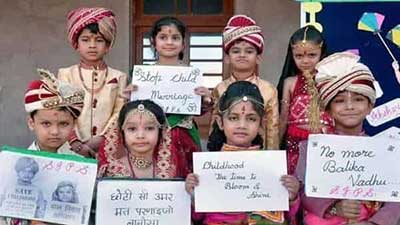Date: 17/02/2023
Relevance: GS-2: Welfare schemes for vulnerable sections of the population by the Centre and States and the performance of these schemes; mechanisms, laws, institutions and Bodies constituted for the protection and betterment of these vulnerable sections.
Key Phrases: POCSO Act, Prohibition of Child Marriage Act, Pandemic, Patriarchal Norms, Education, Mass Campaigns.
Context:
- The Assam government has initiated a drive to arrest those associated with child marriage. Over 2,400 arrests have been made even as the high court has questioned the police for “causing havoc".
Key Highlights:
- Child marriage is not only illegal, it deprives girls of education and a life of opportunities.
- In spite of being illegal since 1978, child marriages have had social acceptance in India.
- Assam government decided to take legal action against men who marry girls aged below 14 under the Prevention of Children from Sexual Offences (POCSO) Act and the Prohibition of Child Marriage Act.
Status of Child Marriage In India:
- India has the highest number of child brides in the world, with almost
one in four girls being married before the age of 18.
- In Assam, the situation is particularly grim, with 32% of women aged 20-24 having been married before the age of 18, according to the National Family Health Survey-5 (2019-21).
- Also, 12% of women in the 15-19 age group in the state were mothers or pregnant. Early pregnancy adversely affects the physical, emotional and mental health of young mothers. It endangers the lives of infants.
- In spite of being illegal since 1978, child marriages have had social acceptance in India. There has been only a marginal decline in their number in the last five years (from 27% by NFHS-4 2015-16) to 23% in (NFHS-5 2019-21).
- Unified District Information System for Education (UDISE, 2017-18) shows
that while 65% of girls complete secondary education nationally, only 52% do
so in Assam.
- Data also shows that while 81.3% of girls in Assam (compared with the national average of 79.4%) joined secondary school, only 42% continued to the higher secondary level.
Reason For Child Marriage:
- While it is imperative to end child marriages, it is equally important to underscore that this harmful practice is deeply rooted in socio-cultural norms and entrenched gender inequalities.
- It is driven by poverty, financial insecurity and a lack of education. Pandemics and disasters see a spurt in child marriages.
- A 2021 UNICEF report on covid, school closures, economic stress, service
disruptions, pregnancy, and parental deaths due to the pandemic had put the
most vulnerable girls at danger of child marriage because their poor parents
saw marriage as a solution to many problems.
- 10 million additional child marriages may occur before decade end, threatening years of progress in reducing the practice, according to the report.
Tackling The Problem:
- To make progress in this area, the state should prioritize efforts to
establish gender equality.
- For example, in Kerala, where the female literacy rate is an impressive 97% (according to the NFHS-5), there has been a significant reduction in the incidence of child marriage.
- In Kerala, only 6% of women aged 20-24 were married before the age of 18, according to the NFHS-5 data from 2019-21.
- To effectively combat child marriage, it is crucial to launch a campaign
with a clear message that legal action will be taken against those who
violate the law.
- Additionally, the state must prioritize investments in social and behavioral change communication, education, and skills training for youth, particularly girls, so that they can further their studies and delay marriage and childbirth.
- Patriarchal norms that exclude young people from decisions about
marriage must also be addressed as it has been found that communication
efforts can yield results.
- "Main Kuch Bhi Kar Sakti Hoon," the Population Foundation of India's entertainment-education series, sought to alter social determinants of health and inspire a public movement for a healthier, cleaner, and more egalitarian society.
- The series increased men's awareness of early marriage's harmful effects from 2% to 31%.
- The answer to discouraging a practice does not lie in sudden mass arrests or the use of force. While enacting laws is essential to address the issue, it is not a sufficient condition.
Conclusion:
- Critics argue that the POCSO Act combines the criminalization of exploitative sexual practices with the general expression of sexuality by adolescents. As a result, there have been calls for a review of the age of consent.
- A sudden use of force is less effective than education and mass campaigns in tackling the issue of child marriage. Therefore, we need to increase investment in supporting adolescents, particularly girls, with education, health, and skills.
- Integrating age-appropriate, comprehensive sexuality education into their curriculum can contribute to their reproductive health. Anything less than these measures would be a shortcut that would not lead to a lasting solution.
Source: Live-Mint
Mains Question:
Q. While it is imperative to end child marriages, it is equally important to underscore that this harmful practice is deeply rooted in socio-cultural norms and entrenched gender inequalities. Comment (150 words).






















